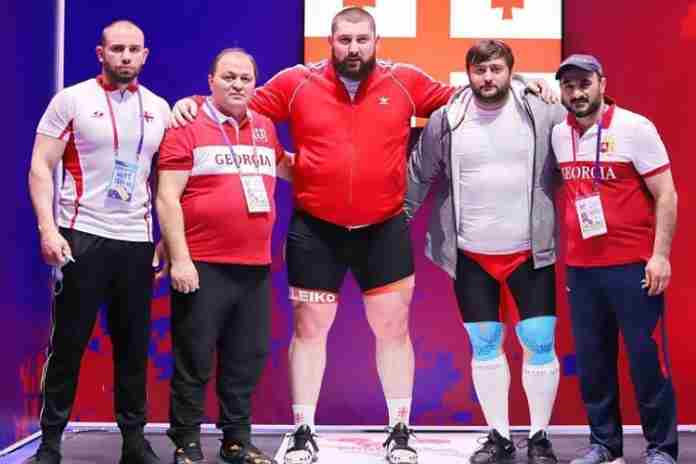The latest news, notes and quotes from the worldwide Five-Ring Circus:
● Games of the XXXII Olympiad: Tokyo 2020 ● It took less than a day after the “100 days to go” celebrations in Tokyo for the Secretary General of Japan’s ruling Liberal Democratic Party to bring up possible cancellation of the Games.
Toshihiro Nikai, considered the second-ranking member of the LDP, said on a television program on Thursday (15th):
“If it becomes impossible, then it should be called off. What is the point of the Olympics if it’s responsible for spreading infections? We will have to make a decision at that point.”
He added in a statement issued later: “What I meant was, if you are asking whether the Olympics and Paralympics should be held no matter what, I would say no.”
Kyodo News reported:
● “Nikai later downplayed his comments, saying the decision to cancel lies with organizers and that the LDP remains committed to supporting the games being staged in a safe and secure way.”
● “Taro Kono, the minister in charge of Japan’s vaccine rollout, said in a separate TV program the games will be held in ‘whatever way is possible,’ possibly without spectators.”
That’s the real upshot of these comments, that the Games could be held spectator-free. An announcement on possible capacities at the venues is expected by the end of this month, but could be pushed back into May.
Haruo Ozaki, the head of the Tokyo Medical Association, warned on Tuesday (13th), “”If infections spread further, in reality it would be difficult to hold the Olympics in its regular form with athletes coming from various countries, even if the Games are held with no spectators.”
All of the worry is predicated on worsening coronavirus infection rates in Japan, which at present are quite modest by European and U.S. standards.
On Friday, Seiko Hashimoto, the head of the Tokyo 2020 organizing committee and an LDP politician herself, told reporters, “I’m not thinking about cancellation. By taking measures to ensure safety and security, we are focusing on hosting the games.”
¶
For those who felt that Russian athletes should have been banned from the Tokyo Games on account of the massive, state-backed doping scandal from 2011-15, Russian Olympic Committee President Stanislav Pozdnyakov had bad news on Friday.
“All in all, we expect about 300-350 athletes to participate in the Olympic Games,” he said in a news conference. The delegation could include up to 650 members, including coaches and staff.
Russian participation in 2016 in Rio was also compromised to some extent by reaction to its doping program and 282 Russian athletes competed in 26 sports there. In London in 2012, a full Russian squad included 436 athletes, competing in 24 sports.
¶
The coronavirus has significantly impacted the qualification for the Games in boxing, at least for the Americas region.
The International Olympic Committee’s Boxing Task Force announced on Thursday that the Americas qualifier tournament scheduled for 10-16 May has been cancelled:
“In recent weeks, tighter travel restrictions and lockdowns have been implemented across the region, which have significantly disrupted international travel and pose logistical challenges to teams travelling to and from Buenos Aires, jeopardising their ability to participate in the event. …
“[A]fter a thorough assessment and consultations with teams, the BTF’s Athlete Ambassadors and boxing experts plus the Local Organising Committee, the BTF has decided to cancel the event and restructure the Tokyo 2020 qualification pathway for the Americas region.”
Because of the late date and the number of people involved (400 expected in all), relocation of the tournament was considered impractical. So:
● “Considering that only the boxers registered to compete in the Americas qualifier would have had a chance to gain one of the Olympic quota places originally at stake in the event, the allocation of the 49 athlete quota places (33 for men, 16 for women) of the Americas Olympic Qualifier will remain exclusive to the athletes registered for the event.”
● “All 49 quota places of the Americas Olympic Boxing Qualifiers will be allocated via the BTF Ranking.”
There are an additional 13 quota places for the Americas which are due to come from the final World Olympic Qualifier and these will be allocated after the 49 places from the Americas qualifier are made.
USA Boxing issued a statement which included:
“[W]e are continuing to cope with the COVID-19 pandemic and understand the safety and health of all those involved in this event, as well as fair opportunities for all boxers to compete, led to this extremely [sic] decision of canceling this event during such a close and crucial time to the Tokyo Olympics.”
It expects the 49 places from the cancelled American Qualifier to be awarded around 10 May and the additional 13 from the World Qualifier by 4 June.
This will likely not be the last chances to the qualifying program for boxing, or for other sports.
● Winter World University Games: Lucerne 2021 ● The long-delayed Winter Universiade in Lucerne, Switzerland and the surrounding area has been confirmed for 11-21 December of 2021, with 60 events over 10 sports and 11 days. There will be added costs:
“The budget for the Winter Universiade 2021 now amounts to CHF 42 million. The fact that the additional costs were kept to around 10 percent of the original budget is down to a number of factors. These include the early decision not to hold the event in January 2021, adaptations to the concept such as a slightly shorter stay for the competitors, and the goodwill of numerous partners such as those renting out the competition venues. The additional costs will be borne particularly by the members of the association, Swiss University Sports and Swiss Olympic.”
The CHF 42 million figure equates to about $45.54 million U.S., up from about $41.19 million U.S. originally. Keep those figures in mind as the 2023 Winter World University Games will be held in Lake Placid, New York.
● U.S. Olympic & Paralympic Committee ● The wild back-and-forth tug-of-war on the use of trademarks like “Puma Tokyo 2021″ between the German sportswear company Puma S.E. and the U.S. Olympic & Paralympic Committee ended quietly this week as Puma abandoned what always appeared to be a long-shot strike at use of Olympic-related marks in the U.S.
The exclusive use of the word “Olympic” and related terms are protected by the Ted Stevens Olympic and Amateur Sports Act in the U.S. and the USOPC filed suit against Puma’s attempt to trademark a whole series of phrases related to the Tokyo 2020, Beijing 2022 and Paris 2024 Games, claiming the USOPC had abandoned the marks.
But on 2 April, Puma withdrew its applications, as well as some related to the FIFA World Cup. Law360.com reported that the USOPC filed to dismiss its suit against Puma last Monday (12th), ending the matter. A joint statement of the parties noted an “amicable settlement.”
● Athletics ● The Court of Arbitration for Sport announced its decision on U.S. sprinter – and World 100 m Champion – Christian Coleman’s appeal of his suspension for “whereabouts” failures, reducing his suspension to 18 months, which will rule him out of participation in the Tokyo Games.
A three-member panel heard the appeal by videoconference on 15 February; the statement noted:
“In coming to its decision, the CAS Panel determined that Christian Coleman had indeed committed an Anti-Doping Rule Violation under Article 2.4 of the World Athletics Anti-Doping Rules, but found the athlete’s degree of negligence to be lower than that established in the Challenged Decision: the Athlete was not at home during the 60-minute time slot on the day of the out-of-competition doping control (9 December 2019), as he should have been, and the Athlete should have been on ‘high-alert’ on that day, given the two existing whereabout failures against him. On the other hand, however, had the Athlete been called by the Doping Control Officer, he would have been able to return to his apartment during the 60-minute window and a test would have been concluded. Although a telephone call during the 60-minute window was not required by the rules, it was nevertheless reasonable for the Athlete to expect such a call, as a matter of standard practice among other Doping Control Officers.
“In conclusion, the CAS Panel determined that an 18-month period of ineligibility was the appropriate sanction in the circumstances.”
The suspension period dates to 14 May 2020, so Coleman will be eligible again on 14 November 2021, after the Tokyo Games, but in time for the full 2022 season, potentially including the 2022 World Championships in Eugene, Oregon.
Coleman can appeal the Court of Arbitration for Sport finding to the Swiss Federal Tribunal, which has only limited grounds for hearing it and is unlikely to disturb the ruling.
¶
The Wanda Diamond League is still more than a month away, but it is already being reshaped by the coronavirus.
The circuit was supposed to start on 23 May in Rabat (MAR), but the situation there has caused the opener to be relocated to Gateshead, England instead. The annual Golden Gala Pietro Mennea in Rome (ITA) has had to be moved to Florence due to the European Championships in football taking over the Stadio Olimpico, and the date has changed from 4 June to 10 June.
That was to have been the date for the famed Bislett Games in Oslo (NOR), but the pandemic has changed that date, with the event re-scheduled (hopefully) for 1 July.
More changes are likely; stay tuned.
¶
Race walking usually doesn’t get as much attention as other events, but it got big support on ABC’s Jimmy Kimmel Live! Show on Monday evening (12th) when the host and sidekick Guillermo Rodriguez got an in-person lesson from 1992 (20 km) and 1996 (50 km) U.S. Olympian Allen James.
The “Slow Road to Tokyo” segment included James whistling by both of them on a trip down the straightaway of a local track. Asked to evaluate the two, James offered:
“Guillermo, you’re probably about a 3 or a 4, somewhere in there,” and on Kimmel, he opined: “With your build, I’d say about a 4 to 5.” Those were on a scale of 10!
● Cycling ● Last February, the Union Cycliste Internationale (UCI) adopted new regulations concerning the leaving of water bottles and trash along the course during road races, requiring that all such items can only be discarded in pre-set zones, effective on 1 April.
Along came the Tour of Flanders – Ronde van Vlaanderen on 4 April – during which Swiss rider Michael Schaer was disqualified for throwing aside a water bottle outside of a designated zone. He said he was throwing it as a souvenir for young fans, but the jury was unmoved.
On Thursday (14th), the Professional Cycling Council – which governs the UCI World Tour – and representatives from women’s road cycling amended the sanctions program:
● “Throwing bottles and waste outside dedicated zones provided by the organiser for this purpose remains forbidden. However, the riders have the possibility to get rid of their bottles and waste by giving them to team assistants positioned on the roadside, in charge of feeding, and to the following vehicles of teams and the organisers.
“Throwing bottles to the public, in particular, is a proven danger both for the riders and the public: on multiple occasions, crashes have been caused by bottles thrown to spectators and coming back onto the road, and spectators have been injured by bottles thrown by riders into the public. Moreover, the UCI wants to avoid fans, notably children, trying to get close to riders during races, to avoid accidents with potentially dramatic consequences (collision with riders or vehicles in the race caravan for example).”
● “At a one-day race, the first infringement will be punished by a fine and a deduction of UCI points (respectively 100 to 500 Swiss francs and 5 to 25 points depending on the class of event), whereas a second infringement will result in the disqualification of the offending rider. Previously, the regulation stipulated a fine, deduction of UCI points and immediate disqualification from the first violation.”
● “At stage races, the first infringement will be punished by a fine and a deduction of UCI points (respectively 100 to 500 Swiss francs and 5 to 25 points depending on the class of event). The second infringement will result in a time penalty (1 minute) and the third to disqualification. Previously, the regulation stipulated a fine, deduction of UCI points and a 30-second time penalty for the first infringement, a 2 minute time penalty for the second infringement and disqualification for the third.”
Thus, littering is still a bad idea.
¶
The U.S. Anti-Doping Agency suspended 52-year-old Masters division mountain biker Vahe Aivazian (Woodland Hills, California) for four years on Thursday, and nullified his results going back 10 years for the use of 10 different prohibited substances!
The USADA statement noted that its investigation was initiated from information provided to it by tipsters:
“This type of information led USADA to discover that Aivazian purchased products containing five different prohibited substances. After investigating further and reviewing additional materials, which USADA received in January and February 2021, USADA learned that Aivazian possessed and used and/or attempted to use five additional prohibited substances. …
“Aivazian’s four-year period of ineligibility began on April 7, 2021, the date on which he accepted the sanction. In addition, Aivazian’s competitive results obtained on and subsequent to June 16, 2010, the date on which he first used prohibited substances, have been disqualified, including forfeiture of any medals, points and prizes.”
The substance list included such doping favorites as Testosterone, Nandrolone, other anabolic agents and hormones. While he was found out, it is also true that he managed to dope successfully for at least 10 years, albeit in the less-scrutinized Masters division.
● Figure Skating ● The season-ending ISU Team Trophy competition in Osaka, Japan will end on Saturday with a team victory for the Russian team, but American star Nathan Chen has once again underscored his dominance in the men’s division.
Chen won both the Short Program and Free Skate in Osaka, both times besting two-time Olympic champ Yuzuru Hanyu (JPN). In the Short Program, Chen was the final starter and edged Hanyu, 109.65-107.12, winning on his Technical Element Score advantage. American Jason Brown was third (94.86).
In the Free Slate, Chen overwhelmed everyone, scoring 203.24 against 193.76 for Hanyu and 180.72 for Russian Mikhail Kolyada; Brown finished eighth (160.33).
Competition continues Saturday and an exhibition will be held on Sunday.
● Weightlifting ● The world’s strongest man is at it again!
Georgia’s Lasha Talakhadze set world marks for the Snatch lift and the Combined lifts total at the European Weightlifting Championships in Moscow last Sunday (11th), finishing with a mind-bending total of 485 kg or about 1,069 pounds.
Now 27, he successfully completed all six of his attempts and was rewarded with his fifth European title and two new world records:
● Snatch: 211 kg (~465 lbs.), 217 kg (~478), 222 kg (~489) World Record
● Clean & Jerk: 245 kg (~540), 253 kg (~558), 263 kg (~580)
● Total: 485 kg (~1,069 lbs.) World Record
Talakhadze broke his own marks of 220 kg in the Snatch from the 2019 World Championships and 484 kg total, also from the 2019 Worlds. He is now credited with a total of 20 world records across two weight classes, at +105 kg and +109 kg: eight in Snatch, four in Clean & Jerk and eight for the combined total.
In case you were wondering, Talakhadze is 6-6 and weighs 389 pounds, so he was lifting 126% of his bodyweight in the Snatch, 149% in the Clean & Jerk and 275% in the total! Wow!
You can receive our exclusive TSX Report by e-mail by clicking here. You can also refer a friend by clicking here, and can donate here to keep this site going.
For our 649-event International Sports Calendar for 2021 and beyond, by date and by sport, click here!


























